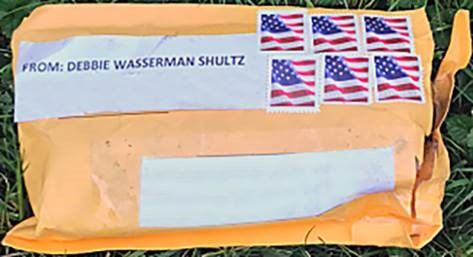The letter bombs are potentially dangerous, not a 'hoax,' and maybe intended not to explode


A free daily email with the biggest news stories of the day – and the best features from TheWeek.com
You are now subscribed
Your newsletter sign-up was successful
The FBI has confirmed that at least some of the 10 "potentially destructive devices" sent this week to prominent critics of President Trump were delivered through the U.S. Postal System, and Homeland Security Secretary Kirstjen Nielsen confirmed to Fox News on Thursday night that some of the packages originated in Florida. Several news organizations have reported that several of the packages passed through a postal facility in Opa-locka, in Miami-Dade County. The Miami-Dade Police Department said its bomb squad is helping federal partners at the USPS Opa-locka facility "as a precautionary measure."
But since none of the 10 explosive devices actually detonated while being handled in the postal facilities, "investigators now suspect that either a would-be bomb maker is inept or the packages were intended to spread fear rather than inflict injury or death," the Los Angeles Times reports, citing two people with knowledge of the investigation. "We are treating it as suspected explosive devices," New York Police Commissioner James O'Neill told reporters on Thursday. "This is something that should be taken seriously. As far as a hoax device, we're not treating it that way."
The bombs seized Wednesday were packed with what's believed to be pyrotechnic powder and broken glass, The Associated Press reports, based on X-rays seen by law enforcement officials. Authorities are warning that there could be other pipe bombs in the mail, and they could be lethal. Retired ATF explosives investigator Anthony May tells CNN that based on X-rays, he hasn't seen "enough means to initiate this device, whether by design, whether by accident," and if "it was designed that way, then the individual's motivation was simply to spread fear, instill fear."
The Week
Escape your echo chamber. Get the facts behind the news, plus analysis from multiple perspectives.

Sign up for The Week's Free Newsletters
From our morning news briefing to a weekly Good News Newsletter, get the best of The Week delivered directly to your inbox.
From our morning news briefing to a weekly Good News Newsletter, get the best of The Week delivered directly to your inbox.
A free daily email with the biggest news stories of the day – and the best features from TheWeek.com
Peter has worked as a news and culture writer and editor at The Week since the site's launch in 2008. He covers politics, world affairs, religion and cultural currents. His journalism career began as a copy editor at a financial newswire and has included editorial positions at The New York Times Magazine, Facts on File, and Oregon State University.
-
 Tourangelle-style pork with prunes recipe
Tourangelle-style pork with prunes recipeThe Week Recommends This traditional, rustic dish is a French classic
-
 The Epstein files: glimpses of a deeply disturbing world
The Epstein files: glimpses of a deeply disturbing worldIn the Spotlight Trove of released documents paint a picture of depravity and privilege in which men hold the cards, and women are powerless or peripheral
-
 Jeff Bezos: cutting the legs off The Washington Post
Jeff Bezos: cutting the legs off The Washington PostIn the Spotlight A stalwart of American journalism is a shadow of itself after swingeing cuts by its billionaire owner
-
 Nobody seems surprised Wagner's Prigozhin died under suspicious circumstances
Nobody seems surprised Wagner's Prigozhin died under suspicious circumstancesSpeed Read
-
 Western mountain climbers allegedly left Pakistani porter to die on K2
Western mountain climbers allegedly left Pakistani porter to die on K2Speed Read
-
 'Circular saw blades' divide controversial Rio Grande buoys installed by Texas governor
'Circular saw blades' divide controversial Rio Grande buoys installed by Texas governorSpeed Read
-
 Los Angeles city workers stage 1-day walkout over labor conditions
Los Angeles city workers stage 1-day walkout over labor conditionsSpeed Read
-
 Mega Millions jackpot climbs to an estimated $1.55 billion
Mega Millions jackpot climbs to an estimated $1.55 billionSpeed Read
-
 Bangladesh dealing with worst dengue fever outbreak on record
Bangladesh dealing with worst dengue fever outbreak on recordSpeed Read
-
 Glacial outburst flooding in Juneau destroys homes
Glacial outburst flooding in Juneau destroys homesSpeed Read
-
 Scotland seeking 'monster hunters' to search for fabled Loch Ness creature
Scotland seeking 'monster hunters' to search for fabled Loch Ness creatureSpeed Read
